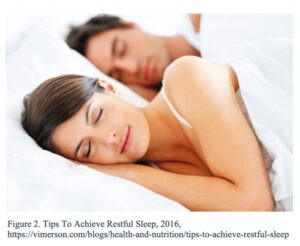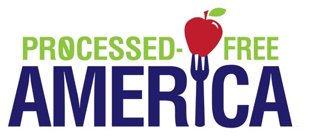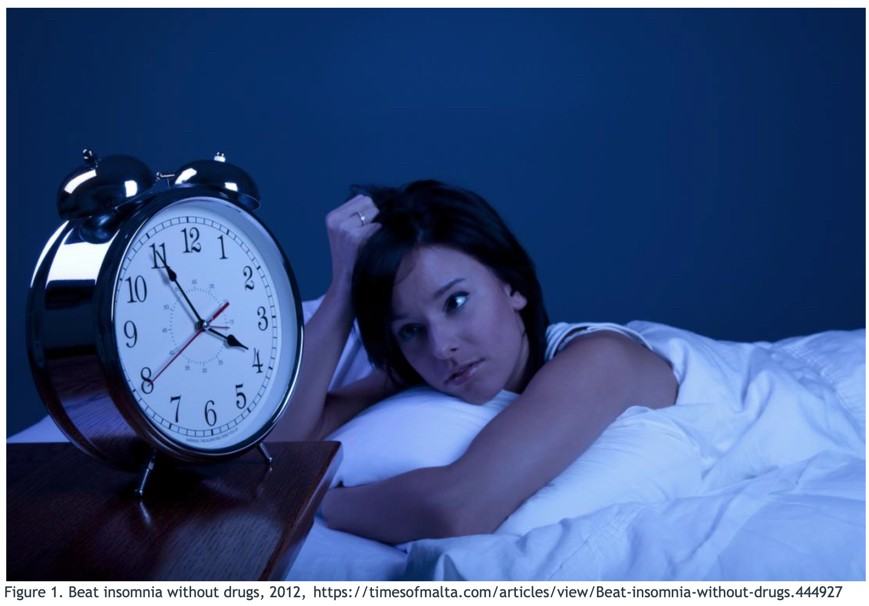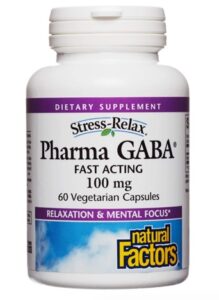If you’re having trouble catching z’s, you’ve probably got insomnia. And if you’ve got insomnia, chances are your brain may not be making enough GABA. The good news is that with the right foods or supplements, it’s fairly easy to increase GABA levels in the brain.
Insomnia Explained
Insomnia is a serious and widespread sleep disorder that affects up to 30% of the population (Pizzorno, Murray & Joiner-Bey, 2016). Most people will experience one of two basic forms of insomnia. If you have sleep-onset insomnia, you have difficulty falling asleep. If you have sleep-maintenance insomnia you don’t have a problem falling asleep, but you wake up during the night or very early in the morning and cannot fall back to sleep. Most people with insomnia feel tired in the morning when they have to wake up and start the day.
Insomnia can be further classified into two main types: primary insomnia and secondary insomnia.
- Primary Insomnia means that your inability to get a good night’s sleep is not directly caused by any other medical condition, psychological disorder or environmental factor.
- Secondary insomnia means that the root cause of your sleep disorder is due to one or more health conditions such as stress (disrupted cortisol levels), tension, depression, anxiety, diabetes and blood sugar imbalances, heartburn, arthritis, gout or other chronic inflammatory diseases, cancer and lowered immune function, pain, medications and alcohol consumption. Secondary insomnia is typically rectified as a result of treating or removing the root causes (Ross, 2019).
What’s GABA Got to do With Insomnia?
GABA (pronounced similar to gaga, as in Lady Gaga) is an acronym for Gamma-aminobutyric acid. It’s an amino acid produced naturally in your brain and serves as a neurotransmitter. Neurotransmitters are natural chemicals that send messages from the body to all the brain’s cells. Some neurotransmitters induce and speed up brain activity while others slow down and inhibit brain activity.
GABA is the brain’s main inhibitory neurotransmitter, which means that it slows down the activity of brain cells and shifts the brain and the body into a more relaxed state. By inhibiting brain activity, GABA calms your mood, reduces stress, lowers anxiety, and most importantly, it helps you snooze soundly through the night.
Research shows that insomnia and disrupted sleep is linked to low levels of GABA production in the brain. Winkelman et al. (2008) found that GABA levels in people with primary insomnia were 30 percent lower than in normal sleepers. Low GABA levels were also associated with more restless sleep and wake after sleep onset occurrences.
Low levels of GABA may be caused by inadequate diet, prolonged stress and genetic factors; therefore, a good boost of GABA may be all you need to get a good night’s sleep.

Get Your GABA On
If you’re low on GABA, there’s some evidence that GABA supplements and foods that contain GABA may help. Byun, Shin, Chung & Shin (2018) found that study subjects fell asleep faster and slept more deeply after taking 300 milligrams of a GABA supplement daily for 4 weeks than those who took a placebo.
GABA is also found naturally in many common foods, so focusing your diet on GAB-containing foods may be just as beneficial, if not more so, than a supplement. Foods that contain GABA include teas (green, black, and oolong), as well as fermented foods such as kefir, yogurt, kimchi and tempeh. A number of other foods either contain GABA or they contain nutrients that boost the brain’s production of GABA.
According to Briguglio (2018), foods with the highest GABA content include:
- Cruciferous vegetables (broccoli, cabbage, cauliflower, Brussels sprouts)
- Soybeans
- Adzuki beans
- Mushrooms
- Spinach
- Tomatoes
- Buckwheat
- Peas
- Chestnuts
- Sweet potatoes
- Sprouted grains
- Brown rice
- White tea
The amount of GABA in food generally ranges from 1 to 40 milligrams per 100 gram serving (Briguglio, 2018).
A Few More Things To Know About GABA
For better sleep, the dose of GABA supplements used in scientific studies is100-200 mg and higher. Individual dosing and length of use will vary.
GABA interacts with antidepressants, medications that lower blood pressure and those that affect brain activity. Herbs and supplements that lower blood pressure should also be used with caution if you are taking GABA supplements. These include cacao, garlic, hibiscus, omega-3 fatty acids and potassium. If you are taking any medications, check with your doctor before taking GABA supplements for insomnia.
Link to the Diet Science Podcast on this subject
DEE’S RECOMMENDATION ON GABA:
References:
Briguglio, M., Dell’Osso, B., Panzica, G., Malgaroli, A., Banfi, G., Dina, C. Z., … Porta, M. (2018). Dietary neurotransmitters: A narrative review on current knowledge. Nutrients, 10(5), 591. doi: 10.3390/nu10050591
Byun, J.-I., Shin, Y. Y., Chung, S.-E., & Shin, W. C. (2018). Safety and efficacy of gamma-aminobutyric acid from fermented rice germ in patients with insomnia symptoms: A randomized, double-blind trial. Journal of Clinical Neurology, 14(3), 291. doi: 10.3988/jcn.2018.14.3.291
Pizzorno, J. E., Murray, M. T., & Joiner-Bey, H. (2016). The clinician’s handbook of natural medicine. St. Louis, MO: Elsevier.
Ross, K. (2019). Module 2 Resources: Insomnia lecture [PDF document]. Retrieved from Lecture Notes Online Website: https://learn.muih.edu/courses/8555/files/958330/download?wrap=1
Winkelman, J. W., Buxton, O. M., Jensen, J. E., Benson, K. L., Oconnor, S. P., Wang, W., & Renshaw, P. F. (2008). Reduced brain GABA in primary insomnia: Preliminary data from 4T proton magnetic resonance spectroscopy (1H-MRS). Sleep, 31(11), 1499–1506. doi: 10.1093/sleep/31.11.1499



This article is a source of inspiration for me, it helps me a lot in sleep problems.
I also used this Rain Sounds https://youtu.be/uSxflHAxweE to
fall asleep easily. Thanks, keep it up!